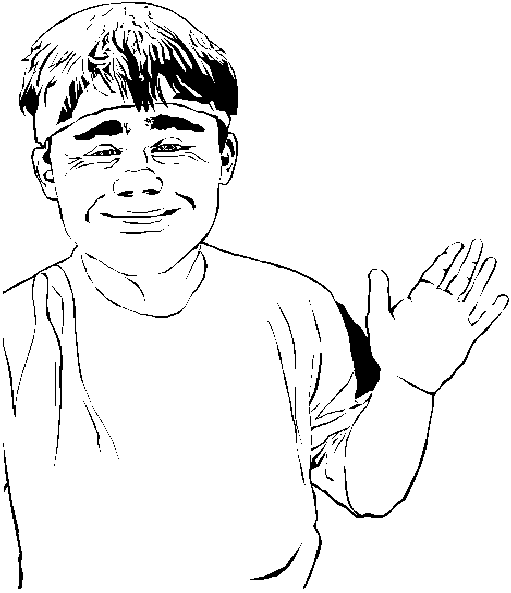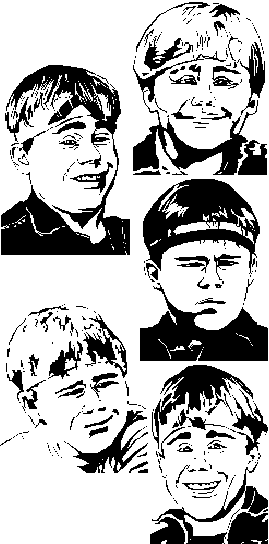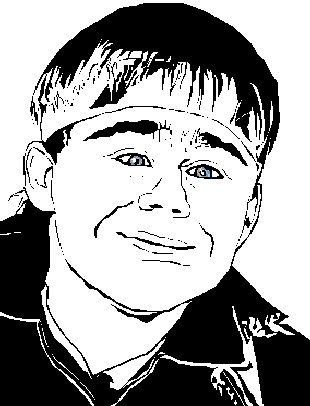
|
A Dramatic Life Eric Cullen's career and his performance as Wee Burney, with list of his main stage and TV appearances |
|
Eric Cullen was a stage-struck child, who invited himself onto the drama courses at the college where his father worked as groundsman; even though he was much younger than the official students. His small stature and child-like proportions made him ideal to play children far younger than his real age, and he had several quite big parts during his teens - even though he was becoming progressively more disturbed by the sexual abuse which he was secretly suffering. The rôle of film in his life was two-edged: at the same time that he was winning acclaim as a child-actor he was also being forced to pose for pornographic pictures. In his late teens he was already getting the comedy parts which were to make him famous; but as he grew older his acting career stalled. Despite continuing abuse he managed to gain a Social Science/Psychology degree and spent a couple of years as a primary school teacher. He was popular with pupils, and showed a deep understanding of and sympathy for children's worries. During this time he also served on a Children's Panel, furthering his interest in educational psychology. When he was interviewed for the Panel he stated that he had been sexually abused, and that he felt this would give him greater understanding of disturbed children. The press would later see this as sinister: but an extensive investigation found no child with any complaint against him whatsoever. He still had an interest in and love of acting. At 23 he successfully auditioned for the part of an elfin warrior in the George Lucas film Willow - only to be dropped because at 4'4" he was too tall! 
Eric was active in his local church, and it was expected that he would be accepted as a Church of Scotland minister when he was a little older and more experienced. But what was intended to be a one-off appearance as Rab C Nesbitt Even when he became a star he retained an interest in church affairs, including the Boys' Brigade (which was not a means to perversion but a defence from it: surrounding himself with people and activity so his abusers couldn't get him on his own). He also became patron of the Volunteer Centre in Scotland and of the David Cullen Childhood Leukaemia Fund, a charity which he founded in honour of his adoptive brother who had died before his own birth. As an adult actor Eric concentrated on comedy. He was a "droll" - someone whose mere presence radiated humour - someone who attracted audience attention even when just standing there doing nothing, because he always looked as if he would be doing something funny any minute now. In appearance he was very short, sturdy, solidly muscular, and inclined to be slightly overweight: somewhat resembling a Staffordshire Bull Terrier, including the grin. His proportions were those of a small child; rather strange in an adult but nothing like the extreme shortness of arms and legs which often goes with achondroplasia. His hands were small even in proportion but well-shaped, without the deformity which usually accompanies his condition. Nor did he have the bulging forehead common in achondroplastic dwarves. His face probably wasn't quite the same one he would have had if he hadn't been a dwarf - he would have had more bridge to his nose for a start - but it was a perfectly usual sort of face, remarkable only for its gentle, owlish look and extreme mobility. He had straight dark blonde to light brown hair (worn in a Spock fringe which hid the bruises left by banging his head against the wall), and striking eyes - long and deep-set, with a blue-grey iris so large he had hardly any white showing. These huge irises are comparatively common in Kent, but he was one of only two people I've seen who had them West of the Medway. In some lights these remarkable eyes shone like silver coins, surrounded by a black ring - but they were barely functional. His sight was so poor that he once did the classic thing of walking off the edge of the stage and into the orchestra pit. Without his glasses he had the strained, peering look of the partially sighted and a tendency to squint, and with them the lenses were so strong that they distorted the apparent position of his eyes. Had he been a more elegant shape he could have made it as a dancer or a gymnast, for he had great muscular control. As it was he used his gymnastic ability literally for clowning around. In Work, the first regular episode of Rab C Nesbitt Much later, I was flipping through a book of equine anecdotes when I came across an account of Native American warriors who used to trick their enemies by dropping down on the far side of their horse's body, leaving just one heel hooked over its back for support, and could hang on and even shoot from that position. Apparently they also used to do this just for fun and to show off, flicking back up onto the horse's back and down the other side in an instant. I knew about this trick in a vague way, but had never given any thought to the muscles involved - until this book pointed out that these young men flipped themselves back up onto the horse using only the purchase of one heel and the muscles of one calf. This explains how Eric's apparent levitation was possible - but it underscores the fact that, despite his blocky, guinea-piggy shape, he was quite an athlete. 
He was also quite a performer. He could convey a wealth of emotion and comment through posture alone, and combined manic physical energy, india-rubber bounciness and remarkable athleticism with an extraordinarily expressive and mobile face, which could flit from handsome choirboy to gargoyle and back in a second - with wild, free-floating black caterpillar eyebrows and a demon grin which went all the way round and hooked on over the ears. He was likewise a fine mimic, with a flexible and expressive voice and excellent comic timing. As Wee Burney he became a household name and a national figure in Scotland. He had huge stage presence which tended to make him the centre of the audience's attention - even when he wasn't supposed to be - and he clearly knew it. He was widely reported to be a blatant scene-stealer who would do anything to get a laugh. 
With hindsight it is clear that this addiction to laughter was primarily a desperate search for reassurance, as a result of the shattering, morale-destroying things that were going on in his life off-stage. In close-up, "Wee Burney" often had a look of desperate strain - of laughing in order not to scream. As a performer his 4'4" stature, rubber-ball bounce and short-legged, large-headed proportions gave him a surreal, cartoonish look; but it was his ability rather than his appearance which made him a star. At Eric's funeral his minister the Rev. Stanley Cook said that we didn't laugh at him for being a dwarf but with him for his great comic talent. In an obituary which appeared in the Guardian Eric's friend and colleague Charles Kearney reported a conversation in which he had called Eric "...a bloody amateur Luvvy!" and Eric had replied "Yes, but a comedy genius as well...". "And", said Kearney, "he was right and we both knew it". Eric Cullen would have been a star at any height - though he probably wouldn't have got the specific part of Wee Burney if he hadn't still been small enough to play a child convincingly. Eric was entirely convincing as the oikish Nesbitt Junior. He himself was refined and cultured, and generally about as unlike Wee Burney as he could get and still be a working-class Lowland Scot. In his teens, however, his behaviour had been "riotous" and "not normal", as a result of the appalling abuse he was suffering: and though he had never shared Wee Burney's coarse, callous nature, he had first-hand experience of what it was like to be a severely disturbed teenager. With hindsight, knowing what was happening to him at the time, it seems sad and sinister to see Eric playing this precociously sexualized, "damaged" child: a child who pretends to be an abuse victim as a joke, saying "This is the gemme [game], in't it, being abused!"; who struggles as he is carried off-stage where he is sexually assaulted with an implement, screaming in mock pain; who is slapped around and called a "wee pervert". In a later episode, after Eric had left, Rab befriends a woman who has been beaten by her husband, and concludes that is is wrong and crass to make jokes about violence to someone who has suffered it. Ian Pattison (the author of the series) did so to Eric every week, though probably unknowingly. Nevertheless Eric's performance as the truculent, cynical Burney was dry and witty, notable for sharp verbal and visual cracks about the events around him. The episode Gifted, which was written specifically to showcase Eric, was chosen as that year's single best British TV comedy; and many fans of Rab C Nesbitt Towards the end of his time as Wee Burney Eric also played the star rôle in a children's TV series called Wemyss Bay 902101, about a surrealistic hotel. This series was written specifically for him. From the little I've seen of it the character he played in Wemyss Bay seems far more like Eric himself than Wee Burney was - but like Eric hyped up and accelerated to the nth degree. As a result of events in his off-stage life Eric suffered an acute depressive breakdown and had to drop out of Rab C Nesbitt Eric said himself that people believed the unfounded press allegations that he himself was a paedophile because when they looked at him they didn't see Eric Cullen at all. Rather, they saw the coarse, suggestive Wee Burney. The instant Eric's successful appeal against sentence was over - as soon, that is, as casting directors knew that a) the charges against him were vanishingly minor and b) he wasn't going to be dragged off to prison in the middle of Act III - he was offered work at Glasgow's Mayfest, but he was far too ill with clinical depression to take it up. He later turned down an audition for the part of Puck because he still didn't feel well enough - though he scraped up the energy to co-found a charity called ACHE (Action on Child Exploitation), which was intended to help children who, like himself, had been forced to star in pornographic pictures. He also made a radio programme speaking about his own experiences and advising children on how to escape from abusive situations. He did make one more major appearance on television - but one in which he had the novel experience of being the subject rather than a member of the cast. An episode of the BBC's religious programme Moment of Truth examined the terrible events of his life, and what effect they had had on his faith. The Scottish public had the novel experience of seeing Eric Cullen rather than Wee Burney. Not only were they completely different personalities: owing to Eric's fluidly changeable face they didn't even look alike. The actors' union Equity stood by him. At the time of his death Eric was suing Glasgow Council for breach of contract - it having dumped him from the cast of a pantomime in the face of screaming tabloid headlines about "Wee Pervy". Eric himself would rather have let the matter drop, but Equity were very keen for him to pursue it and, as he said, the last thing he needed was to fall out with his union on top of everything else. This case was to be conducted at Equity's own expense, in an attempt to establish that actors have rights just like the members of other trades. By that point Eric himself was considering giving up acting, at least as a full-time career, in order to qualify as a Forensic Psychologist and become a counselor for other victims of abuse. The rôle of Wee Burney was the only one he was sure he still wanted. Just before his sudden death he was invited back as Wee Burney for the sixth series of Rab C Nesbitt On the following Hogmanay STV did a review of 1996 news-items called Scotland This Year. It ended with a list of prominent Scots who had died that year - who included Sorley Maclean, George Mackay Brown (who didn't even get a mention), the 10th Duke of Atholl etc.. Of this roll-call of the dead, Eric was first-listed - considered to be the most famous of Scotland's sons, and the greatest loss. Owing to a combination of his own clinical depression, managers' understandable reluctance to hire him while they didn't know what charges he might be facing, and the wild exaggeration of those charges by certain tabloids, Eric Cullen never worked again after his breakdown in summer 1993. Had managers been aware that his heart was "80% diseased" and that he might drop dead at any moment, they would have been even less keen on casting him. However, he crammed an impressive amount of first-rate work into his tragically short career, and his appearances as Wee Burney will probably be repeated for centuries. Even in the later series of Rab C Nesbitt Credits The following is a list of Eric's stage and TV appearances. It's not exhaustive: I know, for example, that he had played Puck at some point, in a local production, but I don't know where or when. If anyone knows of any I've missed (or dates and locations for any of the ones I've got) I'd be glad to hear of them. Television Huntingtower (BBC Scotland serial, '78 or '79) A Sense of Freedom (1981) Playfair The Camerons Govan Ghost Story Deathwatch A Kick Up the Eighties (1984) Laugh, I Nearly Paid My Licence Fee (with Robbie Coltrane & Tracey Ullman) Scotch & Wry Rab C Nesbitt
Wemyss Bay 902101 (1993 Scottish Television children's series, Sunday a.m., with Grant Stott) Moment of Truth (8-Feb-1996 & 7-May-1996, BBC2 religious series)
Theatre Volpone (Royal Lyceum Theatre, Edinburgh) Pride of the Clyde (King's Theatres Glasgow & Edinburgh) George's Marvellous Medicine (touring with Borderline Theatre Company) Rab C Nesbitt Live (stage version touring in 1992/3)
Pantomime Mother Goose (Gaiety Theatre, Ayr) The Gaiety Whirl (Gaiety Theatre, Ayr) Tom Thumb (Gaiety Theatre, Ayr) Babes in the Wood (King's Theatre, Glasgow) Go to Main Menu
|
||||||||||||||||||||||||||||
| ||||||||||||||||||||||||||||